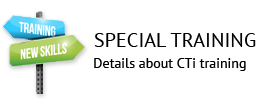Having quality personnel within your Dealership is crucial to its success. To hire quality individuals, the first place to look is within. What we mean by this is that the commitment level and stability of your employee base will directly reflect the commitment you have to your Dealership. When you are interviewing a potential employee, think about what is going through their mind. Where are you meeting, what are you telling them about the position, how secure are they about making a living working for you? All these and more are flowing through their mind during your initial visit.
Running a successful CTI Dealership is a full-time commitment. If you haven’t made this commitment, don’t expect your employees to, you will constantly fight turnover and motivation problems if you do CTI as a sideline to your “real” work.
Once you have made this commitment, then it’s time to start figuring out what it will take in order to keep yourself and your new employee(s) busy. Start with an advertising plan, this will give you an idea of how much advertising or hustling you’ll have to do in order to keep your people busy and productive throughout the year. A good tool for this is the Advertising planner and worksheet located in this manual. This should give you an idea of how much to spend in advertising, how many jobs you will need to sell, and how to plan the applications to keep your crew busy year round. The biggest motivator and loyalty builder you can develop within your staff is their ability to count on you to afford them ability to make a living for themselves and their families.
Who do you look for?
Some tips for recruiting staff that has been shared with us from our Dealership network is
- Find someone who has a family to support.
- Find someone who has a mortgage vs. renting an apartment.
- Your new employee should have a relatively stable job history (no more than an average of one job per year for the last five years.)
- Criminal and credit history checks are becoming more affordable, contact PICA for criminal background checks (normally $50-$75 per check) and Equifax for credit history check (normally $40-$60 per check). This will give you a better feel for the personal habits of your new employee.
What do you offer an employee?
Again, our Dealers have shared with us what their biggest selling points are when interviewing potential employees about their positions.
- A stable, 40 hour per week job throughout the year.
- In a majority of the cases, the ability to work during the daytime only.
- Health care (check into associations such as the Chamber of Commerce or use of a staffing service to help keep these costs down. Also, figure these numbers into your overhead before you decide what to pay per hour for your employees. This should be considered part of their compensation.)
- Bonuses for weeks where the crew installs above average square footages, for keeping call backs below a certain minimum, or if the company does over a certain amount in revenues for the month. These bonuses could be cash, dinner out, or something as simple as a case of beer.
What should I pay an employee and how?
Although it is difficult to provide a generic number that works throughout the U.S. regarding hourly labor rates, below is an example that will at least give you a starting point:
Three crew operation
Lead man: $15-$20 per hour plus health benefits
Second man: $12-$17 per hour plus health benefits.
Third man (part-time in many cases): $8-$10 per hour no benefits.
Considering that you are paying your lead and second man throughout the year and your third man is working 20 hours per week on average, your labor cost for the year would range from $64,480 to $87,360 for their hourly rate annually plus the FICA, and other taxes associated with having employees along with their medical insurance. This three man crew, once semi-accomplished, should be able to install a minimum of 2500 square feet per week. Considering an average year having 45 weeks of installations, your annual production should be in the range of 100,000 to 125,000 square feet annually which means your labor cost per square foot with all items included would run 75 – 90 cents per square foot.
CTI Dealers are split on how to pay their employees. Some pay their employees an hourly rate while others will pay be the square foot installed. The argument regarding the square footage rate is that this will create an incentive to boost productivity since a crew is paid a flat amount regardless of how long it takes them to install a certain job. It also creates a “flat” overhead expense for the job vs. having the labor become a variable.


